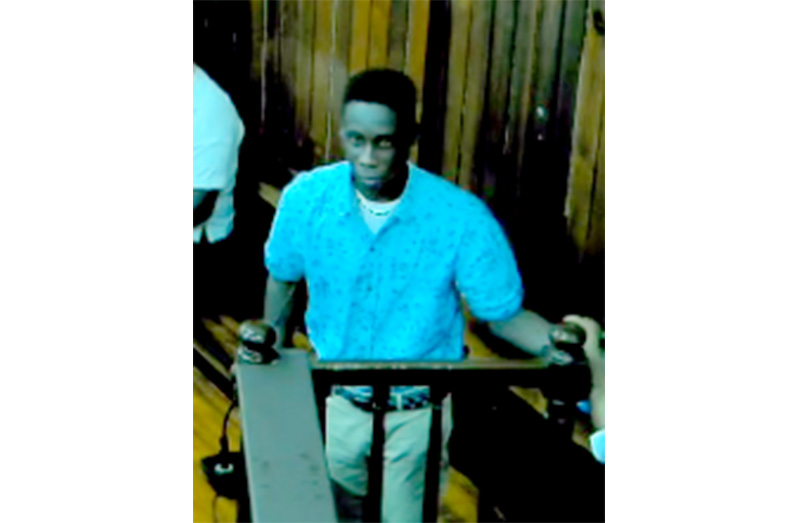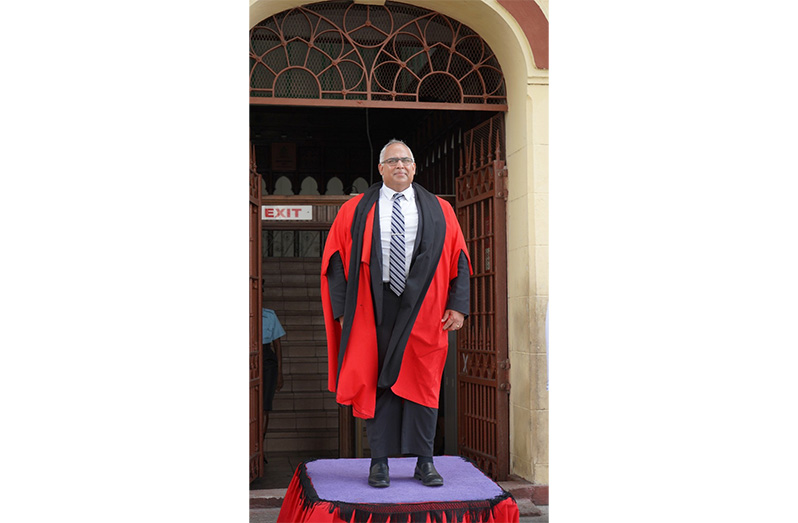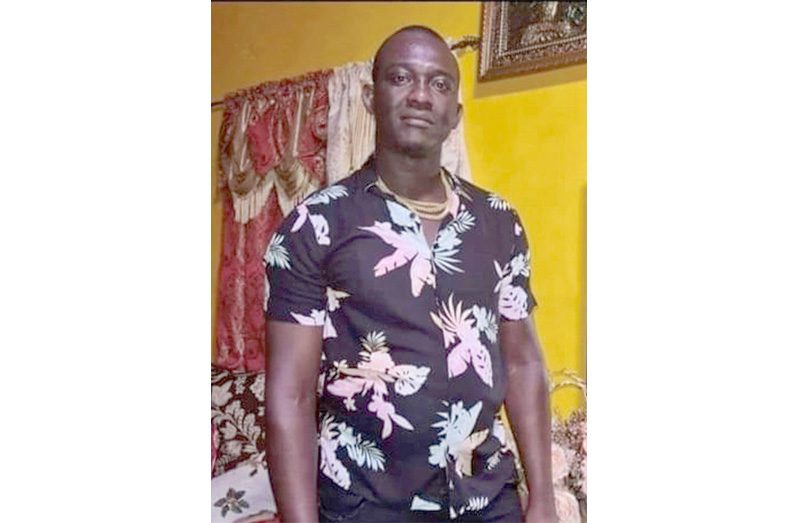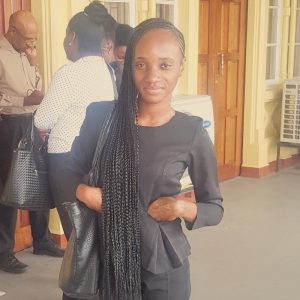SHERWIN Peters, a 36-year-old Special Weapons and Tactics (SWAT) constable attached to the Guyana Police Force (GPF), was, on Thursday, sentenced to 25 years in prison for the 2021 fatal shooting of Dartmouth businessman, Orin Boston.
The court described the incident, which claimed the life of the 29-year-old father of two minors, as an “unlawful” police operation.
The sentence was handed down by Justice Sandil Kissoon at the High Court in Essequibo, following a unanimous jury verdict on June 25, 2025, which found Peters guilty of manslaughter.
The fatal incident occurred on September 15, 2021, when a team of 12 heavily armed SWAT officers raided two houses located within the same compound in Dartmouth, Region Two.

The raid, which was a part of an anti-crime operation, was conducted without a search warrant, arrest warrant, or any legal authority—facts that drew harsh criticism from the presiding judge.
“The actions of Peters were unlawful, unreasonable, unjustified, disproportionate, and excessive,” Justice Kissoon declared during sentencing. “The resort to lethal force was without any basis upon an unarmed [man] asleep in his bed.”
The judge further condemned the overall conduct of the SWAT team, noting that such officers receive specialised training to manage high-risk operations and are expected to demonstrate caution and professionalism. Instead, he said, the officers acted recklessly, violating Boston’s rights and the sanctity of his home, which he described as his “castle.”
EPIPHANY OF LAWLESSNESS
“Since ancient times, every citizen’s home is considered their castle, their sacred space, free from unlawful intrusion—the sanctity of which is never to be violated, otherwise than is provided by law,” Justice Kissoon emphasised.

He added: “The unlawful killing of Orin Boston—a citizen asleep in his home, in his bed, unarmed and helpless at 4:30 A.M. on September 15, 2021, in the presence of members of his family—by Sherwin Peters, in the course of an unlawful break and entry, without a search warrant, without an arrest warrant, and without any legal or lawful basis or reasonable grounds, constitutes the epiphany of lawlessness.”
The judge stressed that institutions such as the Guyana Police Force, recognised and supported under the constitutional framework to protect citizens and their communities, have a fundamental duty to remain constantly aware of the limits of their authority and the legal boundaries within which their powers must be exercised.
According to the trial judge, the SWAT Unit is “not an ordinary team of police officers,” but a highly trained, specialised tactical unit equipped to handle high-risk situations.
He noted that its members are trained in both armed and unarmed combat techniques, as confirmed by the testimony of several police officers involved in the operation.
Justice Kissoon referenced the testimony of Assistant Superintendent of Police Gordon, who stated that he had briefed the ranks beforehand on the GPF’s Standing Orders regarding the circumstances under which they were permitted to discharge their firearms.
“…That is when they [encounter] serious danger to self, and you cannot protect yourself by any other means; when you see a felony being committed in your presence; when a police station is being overrun; when property you swore to protect is being overrun,” he stated while quoting from Gordon’s evidence.
Peters had claimed that there was a confrontation that led to the shooting; however, Justice Kissoon found this assertion to be inconsistent with the evidence.
The judge said Peters’ version was contradicted by testimony from fellow SWAT officers and forensic findings by crime scene investigators.
“Constable Millington’s evidence did not support Peters’ narrative in the video interview of what he alleged occurred. Constable Millington maintained in his testimony that, at all times, Boston never left the bed. In the course of that incident, the evidence shows that Peters discharged his rifle upon Orin Boston, who was asleep and unarmed on his bed, during which a .223 warhead penetrated his left shoulder, entered his heart, and lodged in his body, resulting in his death,” the judge said in recapping the evidence.
FORTUNATE
Justice Kissoon remarked that Peters was “fortunate” not to have faced a charge for the capital offence of murder, underscoring the severity of the offence and the unjustified use of lethal force in a situation involving an unarmed, sleeping man.
“Peters is fortunate that he was indicted for the lesser crime of manslaughter and not murder and had the opportunity of total freedom (release on $1M bail) until the return of the verdict by the jury. Conduct of this kind cannot be condoned by any lawful authority or institution that has a bounding duty to safeguard the welfare and citizens of this land,” the judge stressed.
After Boston was killed, Justice Kissoon observed that ranks proceeded to search his home, the surrounding area, and his livestock pens—yet “found nothing except innocence.”
He stressed, “There is no lawful excuse, no licence to kill. There are no mitigating circumstances [related to the offence] that can justify the actions of Peters and his team that morning.”
The judge also reminded the court that Article 143(1) of the Constitution of Guyana guarantees every citizen protection against arbitrary search and entry.
SEVERE SENTENCE
In determining an appropriate sentence for the convict, the judge noted that while the law provides life imprisonment as the maximum penalty for manslaughter, such a sentence is generally reserved for the “worst of the worst” cases.
He pointed out that this case did not fall into that category.
According to him, the case is marked by numerous aggravating factors stemming from the circumstances of the crime. When combined with the absence of any mitigating factors (related to the offence), he emphasised this underscores the gravity of the offence and places it at the extreme high end of the seriousness scale—warranting the imposition of a severe sentence.
Judge Kissoon specifically underscored that “the entry of Peters and his team onto Boston’s property was unlawful; the breaking of the doors and entry into the home was unlawful.”
He pointed to the testimony of Fiona Michelle Boston, the widow of the deceased, who stated that immediately after their bedroom door was broken down, her husband was shot and killed while lying asleep beside her.
The judge also drew attention to the weapon used in Boston’s killing, describing it as a “modified version of the AR-15 rifle.” He noted that Boston died as a result of haemorrhage and shock due to gunshot injuries to the chest.
Justice Kissoon further rejected Peters’ claim that a confrontation had taken place, pointing out that this assertion was contradicted by the testimony of his fellow officers as well as the findings of the crime scene investigators.
He was careful to emphasise that no wanted bulletin was ever issued for Boston, and at no point did the police visit his home or business place to question him or inform him of any alleged criminal conduct. He also underscored the profound impact Boston’s death has had on his family and the prevalence of gun violence in society.
According to Justice Kissoon, the mitigating factors in Peters’ favour include his age, potential for rehabilitation, a positive probation report, and the fact that he is a first-time offender.
He explained: “This court has taken into consideration that the accused’s presence at the home of the deceased was not an individual act on his part, but as part of a team of members of the SWAT Unit, albeit unlawful. It is in light of this consideration and those factors, and particularly that the accused was a serving member of the Guyana Police Force, that this court feels constrained not to impose an indeterminate sentence of life imprisonment, notwithstanding there are compelling reasons to justify the same.”
Before the sentence was handed down, Peters briefly addressed the court, stating,
“I’m sorry. It was not my intention to kill Orin Boston.”
The judge ruled that the 25-year sentence will be calculated from June 25, 2025, the day Peters was remanded following his conviction. He emphasised that the safety, security, and wellbeing of all citizens remain the court’s singular consideration at all times.
Furthermore, he noted that the court has a duty to protect the community and its members from “criminal excesses” and “dastardly actions of this nature.”
During the trial, Peters was unrepresented by legal counsel. He opted to remain silent when called upon to lead a defence.
However, for the sentencing hearing, he was assisted by attorney-at-law Keoma Griffith.
In a lengthy plea in mitigation, Griffith urged the court to temper justice with mercy, noting that his client was remorseful for his actions and a first-time offender. He also asked the court to consider the overriding objectives of sentencing, including rehabilitation.
State Counsel Latifah Elliot appeared for the prosecution and submitted the aggravating factors to the court in writing.
At the sentencing hearing, the court considered a probation report, a psychiatric evaluation of Peters, and victim impact statements from members of Boston’s family.
Justice Kissoon also addressed the joint recommendation by the Office of the Director of Public Prosecutions (DPP) and the defence for a 10-year starting sentence. He noted that no evidence was provided to justify this proposal, and therefore it held little weight in his final decision.
The judge stated that he understood the primary factor influencing the proposed starting point was Peters’ lack of legal representation throughout his trial.
The judge also addressed the issue of financial compensation paid to Boston’s widow, which resulted from a civil lawsuit filed against the State over her husband’s wrongful killing.
Although both the prosecutor and defence attorney asked the court to treat the compensation as a mitigating factor, Judge Kissoon noted that, under Guyana’s laws, such compensation can only be considered when it is paid directly by the offender—not the State.
In this case, he stressed, it was the taxpayers who bore the burden, not Peters.



.jpg)








